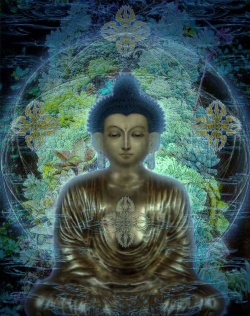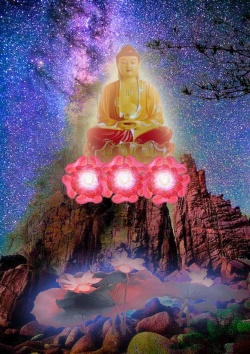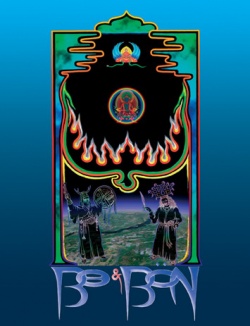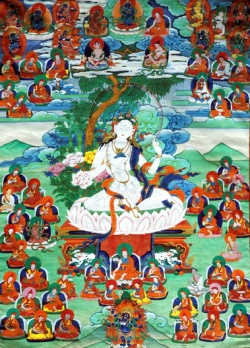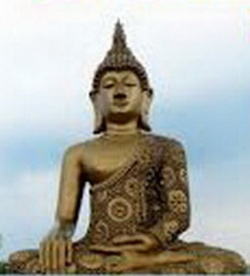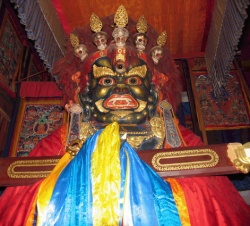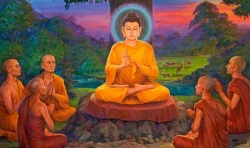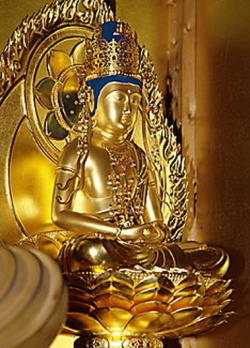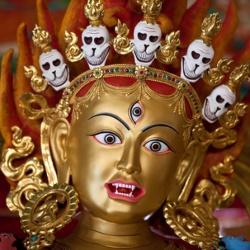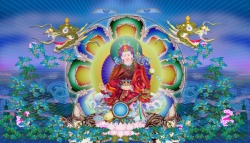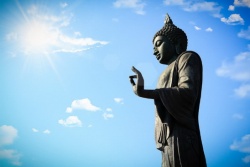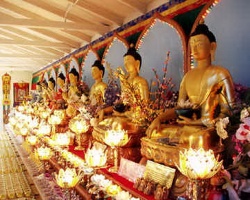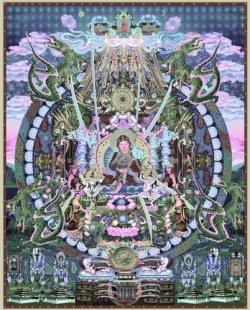The Prasaṅgikas
Jackson Peterson:
"THE PRASANGIKAS
While all the philosophical movements discussed so far tried to 'explain' reality, rather than merely to interpret it, and in this attempt at explanation were forced to set up various hypotheses, the Prasangikas abandoned the temptation to explain and were pre-eminently concerned with pointing out the inherent shakiness of every postulate. Their main target was the notion of 'existence' with its implicit assumption of the thingness of what is claimed to exist. 'Things,' as we have seen, are hypotheses symbolizing possible ways in which events may be connected, but precisely because of their being hypotheses there is no need to introduce a distinction between veridical and delusive aspects which are but concretizations into things of what at best are possibilities.
This does not mean that there is no difference between veridical and delusive situations. The difference is purely pragmatic, not existential. Similarly, there is no need to distinguish between the absolute and its conceptual presence. Such a distinction, far from being invalid, merely tends to reduce the absolute to a concrete entity which then would have to be 'explained' in one way or another. Such an explanation would involve the acceptance of a thesis as a basic premise on which other assertions can be based. It is obvious from this critique of the other schools that for the Prasangikas philosophy was a movement and that they attempted to keep the philosophical spirit alive. The high praise that traditionally has been bestowed on the Prasangikas is due to their radical objection against any kind of reductionism. In order to point out the fallaciousness of any determinate thesis, they developed a formidable technique of argumentation which was designed to pull the rug from under the opponent's feet.
The significance of the Prasangikas as critics and opponents of the reductionist trend in philosophizing lasted until they themselves succumbed to the temptation of accepting certain premises. It is well Righ impossible to say when this happened. But it did happen, as we can learn from rGyal-tshab's statement that the Prasangikas accepted and rejected four theses respectively. ,;Concerning the ground they [the Pdisangikas] do not accept, even propositionally,
(1) the idea of a substratum and
(2) the idea of a thing-as-such, but recognize (i) external objects; concerning the path they do not accept
( 3) categorical conditions and
( 4) self-validating non-referential cognitions, in the intuitive perception of the absolute, but recognize (ii) the disposal of the two kinds of obscuration [[[emotional]] and intellectual] and (iii) the apprehension by both Sravakas and Pratyekabuddhas of the non-essence character of what there is; and concerning the goal they recognize that (iv) the Buddhas have an awareness of reality as it is manifested." Although the Prasangikas are claimed to represent the climax of Buddhist philosophy, this does not mean that the development of Buddhist philosophy has come to an end. On the contrary, the movement from the Vaibhashikas to the Prasangikas is merely the preparatory step from 'speculative philosophy' to 'philosophy lived individually.' This step is possible because Buddhist philosophy has never been purely speculative. The subsequent development is due to a shift in emphasis.
While the Prasangikas are traditionally held to represent the climax of Buddhist philosophy. Mi-pham 'Jam-dbyangs rnamrgyal rgya-mtsho makes it abundantly clear that they merely represent the climax of Buddhist epistemology and that the next step in the philosophical quest is the one from epistemology to Being."
From BUDDHIST PHILOSOPHY IN THEORY AND PRACTICE Herbert Guenther
Like · · Unfollow Post · 23 hours ago
Seen by 62
Kyle Dixon: So Mipham is suggesting that practical, experiential application of the philosophy is a necessary step for those who wish to actualize the teachings, I don't see the issue. Again, this is Guenther, hence the use of the term 'being'.
23 hours ago via mobile · Like
Greg Goode: This is written as though Prasangika is in a kind of competition with tantra or Mahamudra or Dzogchen. The Prasangikas and Gelugs that I know of don't see it that way. They don't see an either/or. They see it as one crucial tool among others. Present company excluded, every scholar and writer and teacher and practitioner I know of who sees Madhyamika insights as necessary for Buddhist development also sees other things as necessary as well. Sometimes Mahamudra, sometimes tantra, sometimes Dzogchen, sometimes Vajrayana, sometimes the Paramitas, etc. In one major Mahayana path that I love, Pure Land, emptiness teachings aren't even studied.
22 hours ago · Edited · Like
Serge Sönam Zaludkowski: Kyle, To my little knowledge, Mipham is quite ambiguous on that point ...
22 hours ago · Like
Kyle Dixon: Most of the key Nyingma figures considered Prasaṅgika to be a definitive view, so they definitely weren't in competition.
22 hours ago via mobile · Like
Kyle Dixon: Serge, I agree, I didn't mean to make it sound like he held to that view exclusively.
22 hours ago via mobile · Like
Jackson Peterson: Actually in the history, Dzogchen found itself under attack from the Gelugpas and the Sakyapas mainly. That is why many of these Dzogchen philisophical texts were written, to clarify the view as being valid. Each school or tradition considered theirs to be the most "correct view". There was no sense of equality at all. The monks even fought battles with each other at times. The Dalai Lamas were cruel dictators in many ways and one had to not go too far to offend the power structures... like what happened to the Jonangpa.
22 hours ago · Like
Jackson Peterson: My point was how Guenther ended the piece. This is similar to the Zhantong view of seeing the necessity of seeing beyond the limited rangtong view, a viewless view that became a view and standard.
22 hours ago · Like
Jackson Peterson: In my opinion one could "get" the entire Prasangika view by simply understanding that Nagarjuna was saying: All concepts are fictions and imagination and are not representative of any actual reality. What is called "conventional reality" is a fiction and does not exist any more than a rabbit with horns. Ultimate Truth also is empty. Since all thoughts are conceptual, all thoughts are only regarding fictional "entities". Therefore the only possible place of peace and truth would be the condition of nirvikalpa, the complete absence of conceptualizing.
22 hours ago · Like
Stian Gudmundsen Høiland: Then one would have "gotten" it incorrectly.
22 hours ago · Like
Jackson Peterson: No Stian Gudmundsen Høiland, the Zen school advocated that "all at once laying down all conceptual notions and conceptualizing all together". This insight is more a wholesale breaking-through than step by step.
22 hours ago · Edited · Like
Greg Goode: Jackson, that's like saying that one could "get" all of Advaita just by understanding that everything is Brahman. There is the not inconsiderable matter of experiential realization, which keeps Madhyamika from being a view.
21 hours ago · Like
Stian Gudmundsen Høiland: What I see are two emphasises:
1) There's all this. I dare call it 'undeniable'. Its nature is easily misunderstood, because it is blazingly obvious and seems to be the main ingredient in any subjective sense of anything being *real*.
2) But where is it? I dare call it 'unfindable'. The prasangika system seems to have been getting at categories of unfindability. Arbitrary, non-inhering, relative – there is no yardstick or measure.
These perspective have interesting consequences by being nondual and inseparable. For example 'functionality', i.e. relative, conventional truth. And 'freedom' or 'potentiality', i.e. absolute, ultimate truth.
21 hours ago · Like
Stian Gudmundsen Høiland: Jackson, please don't forget the pre/trans fallacy.
What I consider incorrect is not your take on nirvikalpa, but emptiness. As usual
21 hours ago · Edited · Like
Jackson Peterson: Greg Goode, it is much harder to reach the Brahman as a grasping of a non-known. But in this case all grasping is released and conceptual fictionalizing is just dropped. We can do this in shamatha meditation gradually or like in Zen suddenly. Its a wholesale project where instead of waking up in little pieces, we just cease day dreaming by seeing the whole gestalt of being in a day dream. I am not saying this is the only way... but its a very powerful way if the insight is clear. This is what happens in Zen. There is no step by step in Zen or Dzogchen or Essence Mahamudra. Don't get me wrong, I think Mahdyamaka is just fine and has a usefulness if that floats your boat.
21 hours ago · Like
Greg Goode: Stian, undeniable, unfindable - what path are you talking about here?
21 hours ago · Like
Jackson Peterson: Stian Gudmundsen Høiland, what aspect of "emptiness"? I see everything as "empty", including "Being". So what's left to have a problem with my "emptiness"?
21 hours ago · Like
Greg Goode: Jackson, are you comparing the hardness of Advaita with something else? What's hard also depends on the aspirant. Hardness is not an objective thing....
21 hours ago · Like
Stian Gudmundsen Høiland: Greg: luminosity and emptiness. There seems to be several paths taking them separately. Dzogchen and Mahamudra seems to integrate them.
Jackson Peterson, "Being" is a "fiction and imagination (...) and does not exist any more than a rabbit with horns"? You concur?
21 hours ago · Edited · Like
Kyle Dixon: Guenther ended the piece with his bias towards 'being'. Rangtong is something shentongpas made up to contrast their view, you're obviously partial to the shentong view therefore you consider rangtong limited. 'Rangtongpas' (which is pretty much anyone who doesn't adhere to a shentong view), would likewise consider the shentong view to be erring into an extreme, and therefore also limited. The whole argument is a byproduct of shentongpas seeking to validate their view by deprecating the traditional Madhyamaka view, just as you're doing here.
21 hours ago via mobile · Like · 1
Jackson Peterson: No Greg, I was just using your example... Your example doesn't work regarding Advaita, which was your point. I am saying my point does not equate to your example...
21 hours ago · Like
Jackson Peterson: No Kyle, you need to study the debates... You are misinformed. Its much more subtle than that.
21 hours ago · Like
Malcolm Smith: Dzogchen has a long tradition of deprecating Madhyamaka analytics, while agreeing with the essential philosophical point of freedom from extremes. Kyle is correct in echoing my long standing observation that "rang stong" is just a strawman the gzhan stong pas set up to refute. In reality, no one in Tibet admits to be a rang stong pa for many reasons.
21 hours ago · Edited · Like · 1
Malcolm Smith: Even the Gelugpas do not accept the appellation "rang stong"
21 hours ago · Edited · Like · 1
Jackson Peterson: No Stian Gudmundsen Høiland, and yes Stian. Being is an irreducible "presence" like non-conceptual space. You can't find it. It has no endurance. It has no substance or shape. Its never apart from what appears. It is what appears. Its what knows appearing is happening, that's what endures.
21 hours ago · Like
Malcolm Smith: Being is an abstraction. There is no Being, only beings.
21 hours ago via · Like · 2
Jackson Peterson: I love it Malcolm!
21 hours ago · Like
Jackson Peterson: Malcolm Smith, without being ambiguous please clearly respond for the benefit of our audience: "Perhaps you can clarify that indeed the "looking" is not dependent on an object, and is non-dependent period, and is self-originated?" (or self-arising) or (unborn)
21 hours ago · Edited · Like
Kyle Dixon: Jackson, 'beings' meaning sentient beings i.e. those who are confused about (or ignorant of) their nature. The opposite of a Buddha.
21 hours ago via mobile · Like · 1
Jackson Peterson: Malcolm you just gave Kyle a big headache with "Being is an abstraction. There is no Being, only beings."
21 hours ago · Like
Malcolm Smith: In Dzogchen the distinction between conditioned and unconditioned is purely nominal, existing from the point of view of ignorance. Just as in Madhyamaka, the two truths are only seen from the point of view of the ignorant person. Buddhas only see one truth,
21 hours ago via · Like · 1
Jackson Peterson: Ok Kyle... so then you agree that there are "beings"?
21 hours ago · Like
Jackson Peterson: I knew you were going to take a pass on the question Malcolm Smith!
21 hours ago · Edited · Like
Malcolm Smith: Not really Jax. Being is a universal, which even in Dzogchen logic is a total non-existent. Beings are particulars, which have conventional status, even in Dzogchen texts. In this respect, Dzogchen follows the standard lines of Buddhist logic ala Dharmakirti,
21 hours ago via · Like · 1
Greg Goode: Jackson, Kyle is not totally off-base - I have never seen the rangtong/shentong distinction iused in Gelug texts or commentaries. Perhaps it is Kagyu and Nyingma family business...
On Advaita and Madhyamika - people from outside a person's path quite frequently underestimate it. "All you are saying boils down to this one point I am making."
OK, if so, why doesn't the one who propounds the path say it like that? Why is the externalist's account more correct?
21 hours ago · Edited · Like
Jackson Peterson: Kyle, even the Buddha said he would not be a Buddha if he saw anything called "beings" or "persons" in the Diamond Cutter of Doubts Sutra. I don't conceive of beings or a Being. What is experienced is again altogether different in a moment "lookingness" or "instant presence".
21 hours ago · Like
Jackson Peterson: Greg, your reading is limited to current stuff. The debates and hostility was deep and important for many reasons. The Nyingma and the Kagyu got along just fine regarding this topic.
21 hours ago · Like
Kyle Dixon: There are sentient beings and there are Buddhas. Sentient beings, ignorant of their nature, see sentient beings and Buddhas. Buddhas, who are free of ignorance, see neither sentient beings, nor Buddhas. Out of compassion however they lead those who are truly Buddhas, yet confused, to liberation. From the perspective of a Buddha though none of these designations escape conventionality.
21 hours ago via mobile · Like · 2
Jackson Peterson: But Malcolm, if we are following Nagarjuna, then we have to concede that all convential realities of any conventional status are purely fictional.
21 hours ago · Like
Malcolm Smith: Jackson, FYI, there were some Sakya scholars who debated certain trends in Dzogchen (mainly sems sde like Aro lugs and Khams Lugs), but in general Sakyapas accept Dzogchen as valid.
21 hours ago · Like
Malcolm Smith: Correct, that is also the point of view of Dzogchen,
21 hours ago · Like · 1
Jackson Peterson: Yes, now... but I am not talking about now... I was referring to the historical trends... Now its all do as you please!
21 hours ago · Like
Malcolm Smith: Indeed Rongzom points out that main point of superiority of Dzogchen was the extent to which Dzogchen is willing to regard everything, relative as well as ultimate as totally illusory
21 hours ago · Like
Malcolm Smith: I am talking about historical trends.
21 hours ago · Like
Greg Goode: Jax, I know the debates go back a looooong time. But can you find any text from Nagarjuna, Chandrakirti, Dharmakirti, or other Indians, or Tsong-kha-pa, or any Gelug successor who makes that shentong/rangtong distinction?
21 hours ago · Edited · Like
Jackson Peterson: But that is already the Prasangika view
21 hours ago · Like
Malcolm Smith: Some of the most trenchant criticisms of Dzogchen come not from Sakyapas, but from Kagyus
21 hours ago · Like
Jackson Peterson: Of course Greg, Malcolm can do so better. I actually have some of the texts...
21 hours ago · Like
Malcolm Smith: Gregg Kedrupo Je talks about gzhan stong and rang stong in his stong chung chen mo, and rejects the appellation rang stong for the gelug view
21 hours ago · Like
Malcolm Smith: However, there were also Gelugpas who were gzhan stong pas, though their works were unpopular
21 hours ago · Like
Jackson Peterson: Well, not about Rangtong versus Shentong... Isn't more about thought being Dharmakaya or not? Malcolm Smith
21 hours ago · Like
Malcolm Smith: Huh?
21 hours ago · Like
Jackson Peterson: Regarding Kagyu versus Nyingma
21 hours ago · Like
Malcolm Smith: No, it was actually over togal, etc.
'
21 hours ago via · Like
Jackson Peterson: Kagyu Mahamudra says "thoughts are Dharmakaya", Longchenpa says no...
21 hours ago · Like
Jackson Peterson: Wow! Never heard that! What was that about?
21 hours ago · Like
Malcolm Smith: yes, there is also that debate
21 hours ago · Like
Malcolm Smith: Eighth Karmapa was basically a Sarma guy. There was also Drikung Palzang
21 hours ago · Like
Malcolm Smith: Among early Sakya Dzogchen masters however we have Sakya Pandita's guru, Jetsun Dragpa Gyaltsen
21 hours ago · Like
Jackson Peterson: But the Karmapa's had their own Dzogchen lineage...no?
21 hours ago · Like
Malcolm Smith: It (Karma Nyinthig) was a very controversial teaching for a long time and was not widely accepted.
21 hours ago via · Like
Jackson Peterson: Yes... interesting. Ok, I will try again: Is the rigpa, the "looking" as you coined it earlier today... dependent in any way, either on an object or a condition? Or is it "objectless looking"? Malcolm Smith
21 hours ago · Edited · Like
Malcolm Smith: rig pa is not the looking, rig pa is the discovery.
21 hours ago · Like
Malcolm Smith: looking is still mind, the discovery is beyond mind
21 hours ago · Like
Jackson Peterson: Ok, is the "looking" that is discovered, dependent in any way? Or is it "objectless looking"? I am not referring to the fifth skandha.
21 hours ago · Edited · Like
Malcolm Smith: Dzogchen moves beyond the dichtomy of dependent/non-dependent. That dichotomy is a sutrayāna trap
20 hours ago · Edited · Like
Jackson Peterson: Ok, then, you are being "coy". Is that "instant presence" beyond the mind, that is discovered, dependent in any way or is it objectless?
21 hours ago · Like
Malcolm Smith: Put it this way — being in the state of vidyā is unconditioned, being in the stage of ignorance is conditioned; but vidyā and ignorance concern the perception or misperception of the same primordial state which is beyond the dichtomy of conditioned or unconditioned.
21 hours ago · Edited · Like · 1
Malcolm Smith: Not being coy, the question is based on sutrayāna dichtomies that do not apply
21 hours ago · Edited · Like · 1
Jackson Peterson: Ok... so then is the "primordial state" in the knowing of it, dependent in any way?
20 hours ago · Like
Malcolm Smith: When it is perceived through ignorance, then all conditioned entities like the three realms, etc, appear. When it is perceived through vidyā, all these things gradually disappear; but the basis itself is beyond this dichotomy.
20 hours ago · Like
Jackson Peterson: Ok... so then indeed, being beyond this dichotomy, means it is not dependent and not conditioned. An appearance of, as a fictional story, arises about something being conditioned. But the primordial state itself is never conditioned or dependent on conditions in order for it to be the primordial state... right?
20 hours ago · Like
Stian Gudmundsen Høiland: Interesting conversation. "Looking" = ’od gsal ba, luminosity, since it it "still mind"?
20 hours ago · Like
Malcolm Smith: You cannot call it conditioned in a real sense because it is originally pure; but you cannot call it unconditioned in a real sense because of lhun grub, which has processes, and which serves as the cause of both vidyā and āvidyā.
20 hours ago · Like
Malcolm Smith: Like I said, the sutrayāna dichotomy of conditioned/unconditioned is irrelevant in Dzogchen since the five elements ("conditioned") are equally the five lights ("unconditioned").
20 hours ago · Like
Malcolm Smith: "looking" - gsal ba, which simply means clear or distinct
20 hours ago · Like
Jackson Peterson: I think you are wrong there Malcolm Smith, in just my opinion. The pure aspect of the Dharmakaya is never conditioned by its own luminosity, only sem and its attributes are conditioned and are indeed the luminosity itself. Perhaps you are trying to hard to not commit..
20 hours ago · Like
Malcolm Smith: If one does not transcend this dichotomy, one will be very far away from the meaning of Dzogchen indeed.
20 hours ago · Like · 2
Stian Gudmundsen Høiland: So clarity, which I've been calling luminosity or cognizance.
http://rywiki.tsadra.org/index.php/gsal_ba
20 hours ago · Like
Malcolm Smith: Jax, reread "You cannot call it conditioned in a real sense because it is originally pure..."
20 hours ago · Like
Jackson Peterson: Stian Gudmundsen Høiland, the Clear Light is not "mind" or sem. A quality of the Clear Light is "Knowing" or "Seeingness" like insight. The Clear Light is the immediate radiance of Rigpa and is the Clarity of the Primordial State, and is not conditioned ever, but is certainly empty, yet appearing, empty-form.
20 hours ago · Like
Malcolm Smith: You are missing a subtle point because you are conditioned [heh] by sutrayāna thinking on this point re: conditioned/unconditioned
20 hours ago · Like · 1
Stian Gudmundsen Høiland: Jackson, my comment was in reference to these comments:
Malcolm Smith said:
> rig pa is not the looking, rig pa is the discovery.
> looking is still mind, the discovery is beyond mind
20 hours ago · Like · 1
Kyle Dixon: Jackson, dharmakāya is a convention.
20 hours ago via mobile · Like · 1
Jackson Peterson: Ok... Malcolm Smith came clean: ""You cannot call it conditioned in a real sense because it is originally pure..." With that bit of wisdom I am off to bed, 1:11 in the morning here. Its been fun! I think this was useful for many!! Much love to all, Malcolm, Stian and yes, even Kyle!
Nite!
20 hours ago · Like · 3
Jackson Peterson: Ok, Kyle... You are a convention! nite!
20 hours ago · Like
Kyle Dixon: I'm just saying, the mind can grasp at these notions and that grasping can lead to an exaltation of certain notions over others, acceptance and rejection etc., which is all well and good in it's place. However dharmakāya is signifying a freedom from mind, grasping etc. (I'm also falling victim to the same principle here in attempting to define dharmakāya, but that's a byproduct of language).
20 hours ago via mobile · Edited · Like · 3
Laurel Carrington: Yes, it's been an interesting discussion, even though I have no idea what you guys are talking about at least two thirds of the time! Jackson, I'm currently enjoying the first few chapters of your book. Greg, I have one of yours on my Kindle now, so you're up next.
6 hours ago via mobile · Like · 1
Jackson Peterson: Ah, wonderful Laurel Carrington!
5 hours ago via mobile · Like · 1
Greg Goode: Laurel, I have another book coming out in a few weeks - this one on emptiness.
4 hours ago via mobile · Like · 5
Jackson Peterson: Please post the links Greg Goode! I want one !!!
2 hours ago via mobile · Like · 2
Greg Goode: Here is a very tentative table of contents, subject to change. The book starts out by setting forth how the Tsong-kha-pa approach studies the emptiness teachings. It invites the reader to go and do similar projects for the Mahamudra and Dzogchen approaches. And then it covers a smorgasbord of Western issues, and a variety of analogous Western ways to experience emptiness. Most of the book is about Western modalities, from Pyrrhonism to neuroscience. The heart of the book is a collection of over 80 meditations from all different angles.
Here's a TOC:
INTRODUCTION
Nondual, But Different
The Plan of This Book
Some Emptiness Stories
2 – BUDDHIST AND WESTERN SOURCES
Overview to Emptiness
Emptiness teachings in the West
(Role) Models for Studying Emptiness Teachings
How Does One Go about Studying Emptiness?
Emptiness, Compassion and Happiness
How to Avoid Nihilism
Emptiness FAQ
3 – MEDITATIONS
The Emptiness of the Self
The Emptiness of Personal Labels
The Social Construction of Truth
Refuting Moral Objectivity
What’s Wrong with Correspondence?
The Myth of the Given
The Absence in Presence
On Not Knowing
Radical Interdependence
4 – LIVING AN EMPTY LIFE
What Is It Like?
The Empty Life – Buddhist and Non-Buddhist
Enlightenment, Awakening Is There an End?
A Surprising Freedom in Emptiness
Joyful Irony And The Emptiness Journey
Common Benefits Of Studying Emptiness
Reality By Design: Examples Of Empty Lives
Your Empty Life
Readings from Western Sources
Readings from Buddhist Sources
about an hour ago · Edited · Like · 4
Piotr Ludwiński: Looks great!
about an hour ago · Like
Jackson Peterson: Looks great Greg Goode!
about an hour ago via mobile · Like
Albert Hong: Will there be kindle editions? I'd like both a paper copy and digital!
about an hour ago via mobile · Like · 1
Greg Goode: Yes there will be, and they will appear at the same time, I hear.
